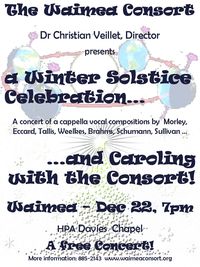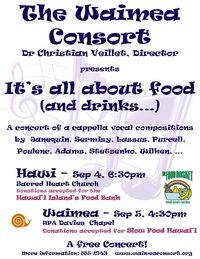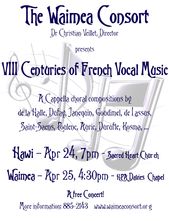The Waimea Consort An a cappella vocal ensemble on the Island of Hawai'i
2010 Concerts

A Winter Solstice Celebration...
A concert of a cappella vocal compositions by Morley, Eccard, Tallis, Weelkes, Brahms, Schumann, Sullivan, Ticheli, de Lange, ...
...and Caroling with the Consort
Program short description This concert will be, as usual with the Consort, an opportunity to explore a cappella music from the 15th century to contemporary compositions. Rather than being presented chronologically, it will start with "April is in my mistress' face" by Morley, an occasion to move through months up to December, followed by songs about Autumn by Brahms and contemporary composer Huub de Lange, setting the stage for a performance devoted to the passing from Autumn to Winter and celebrating light, as from the Winter solstice on days are starting to get longer and nights shorter.
Winter is cold, but two composers from the 16th century will remind us that the thought of warmer days ahead can help us endure the bitternes of the season: Eccard in "Der Winter kalt", and Weelkes who will give advice on how "To Shorten Winter's Sadness".
Let's forget the cold and sing about light! Tallis will come fisrt with "O Nata Lux", followed by a stunning 8-part composition by Schumann, "Ungewisses Licht", where light is seen at the end of a difficult journey, though it is hard to know what to make of it... "Lead, kindly Light" by Sir Arthur Sullivan will lead us to the light from the stars in "Constellation" by contemporary composer Ticheli.
A few rounds and a couple of surprises will punctuate the program, which will conclude with a caroling session in which the audience will be invited to join the Consort and celebrate the Season!

It's all about food (and drinks...)
A concert of a cappella vocal compositions by Janequin, Sermisy, Lassus, Purcell, Poulenc,
Adams, Stetsenko, Wilken, ...
Program short description This concert will be, as usual, an opportunity to explore a cappella music from the 15th century to contemporary compositions. Rather than being presented chronologically, it will start with "If Music be the Food of Love" by Purcell to set the stage for a performance devoted to food, followed by two songs about the sacred side of food, the "Mystical Supper" and the "Miracle Meal", by contemporary composers Stetsenko and Inglis.
Wine takes us back to the 15th/16th century with two songs, "Is it really that good?"/"Who gets to drink the good one?" before returning to the present with a piece by Loren Wilken (Big Island pianist and composer) on a poem by Ogden Nash, "the Clean Platter". And now the meal commences!
First, off to a hunt with 19th century English composer Pearsall, then there's barley to harvest and grind in a mid-17thcentury Sermisy as well as a mid-1900's version by Poulenc. Now it's time to shop the market in the streets of Paris and buy "pâtés tout chauds" ou "pêches de vigne" with Janequin's "Les Cris de Paris". As the meal is prepared, there's ale to drink with music by Adams on a poem by Poe. While waiting for the food, get drunk on wine with Lasso's 16th century tavern song.
Renaissance's Sermisy checks if pork should be on the menu, with a modern round about berries, and finally the partaking of the meal with members of the Order of St Babouyn in a piece by Loyset Compère of the late 1400's. The early Renaissance piece rises like a souffle into a "Repas Boogie Whouah", a modern composition by Richardot and Vincent. And in a neat closing round, there's nothing left but dirty dishes!
VIII Centuries of French Vocal Music
A journey of discovery through centuries of French a cappella vocal music

Program short description
The program will start in the middle of the 13th century, at a time when singing went away from simple chanting with only one melodic line, as used in most cultures in the world at that time, in a move toward a more complex vocal expression, polyphony, involving two or more melodic lines singing at the same time.Adam de la Halle's Rondeaux are the first example of such polyphony in the secular world. While their harmony has not taken yet the shape our ears are used to nowadays, these pieces are in many ways very "contemporary".
150 years later, with Dufay, we will see how polyphonic composition has evolved to lead to the 16th century's more familiar harmonies illustrated in Chansons or Palsm settings by composers like Janequin, Goudimel or Lassus.
Two very peaceful compositions by Saint-SaŽns will bring yet another type of harmony in a more romantic mood typical of the 19th century, and will be our bridge to the modern era.
The harmonization of two old folk songs by Poulenc and compositions by Auric on two 15th century poems will show how much polyphony evolved since its early days.
Gregorian chant, which was flourishing at the time of Adam de la Halle, is the inspiration for the closing songs of the concert: these four pieces on Gregorian themes, written by Duruflé in 1960, are a stunning revisit of old melodies with much freedom of rhythm and harmony, and a nice illustration of the evolution of French vocal music over eight centuries.